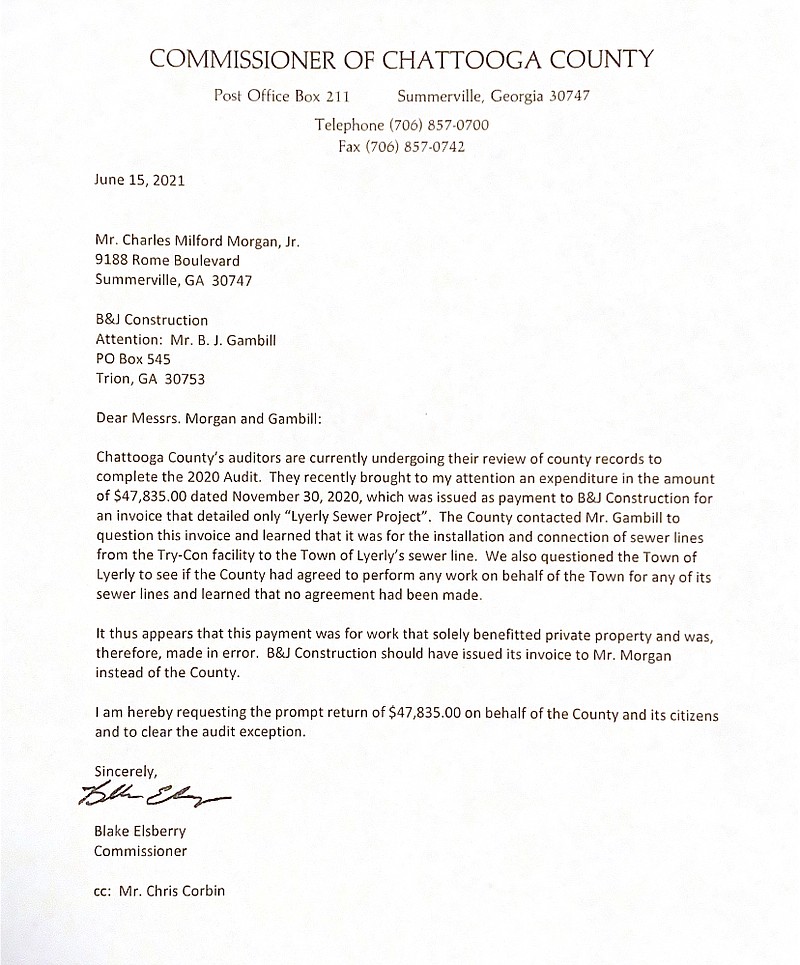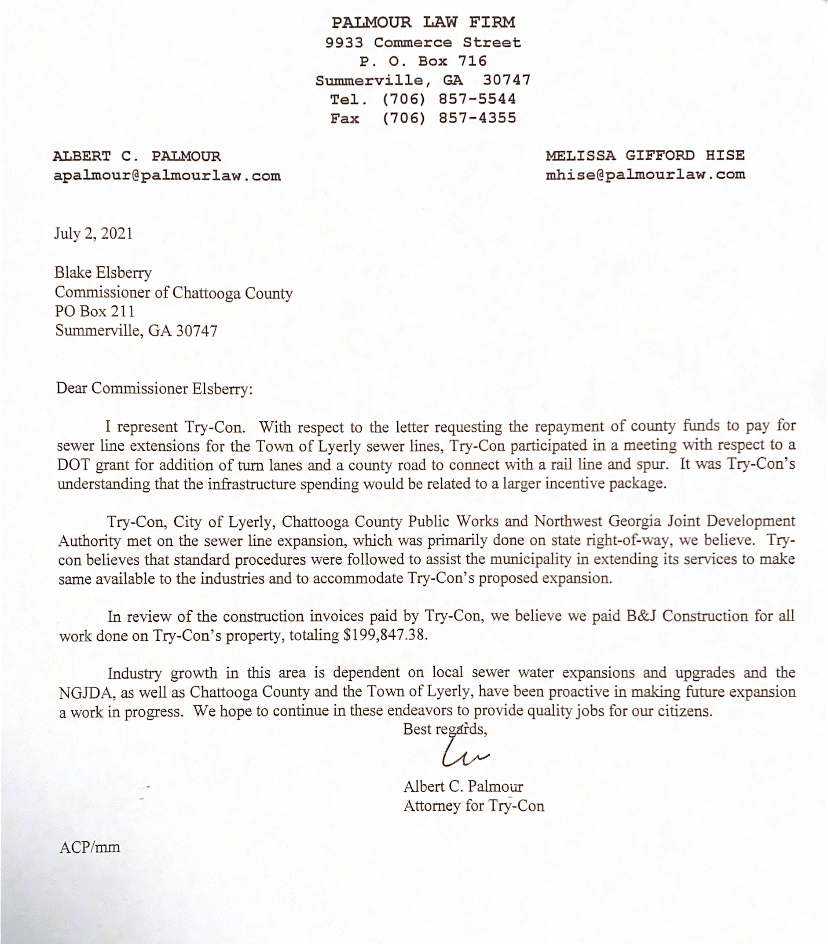A state financial audit recently revealed a potential violation of the Gratuities Clause in Chattooga County.
The Gratuities Clause is a section in the Georgia Constitution that prohibits the General Assembly from using tax dollars or state property to donate, offer a gratuity or forgive a debt or other obligation of a private entity or individual. Essentially, the clause prevents the government from lending or gifting public funds to individuals without a benefit to taxpayers in return.
In the case of Chattooga County, Sole Commissioner Blake Elsberry said the potential violation stemmed from an invoice in the amount of $47,835 that was paid to B&J Construction on Nov. 20.
"At the end of the audit, there is a comment for a possible violation of the Gratuities Clause from the state of Georgia. It's based on an invoice that was found for $47,000 and some change for a sewer project," Elsberry said during a news conference at the end of July. According to him, the project involved the installation and connection of sewer lines from a Try-Con Tufters Inc. facility to the town of Lyrely's sewer line. No other details were noted on the invoice in relation to the scope of work or where exactly it was being done.
"There is a possibility that some of the work may have been done on private property," Elsberry said. "We're not sure yet. Anything I say would be speculation at this point, as I don't have all the information. I'm trying to get information from the construction company that did the work so I know where it was done, whether it was on private or state property, and what the span of the project was."
The funds used to pay for the work came out of the county special purpose local-option sales tax (SPLOST) account.
A SPLOST is an optional 1% county sales tax used to fund capital outlay projects. In Chattooga County, SPLOST proceeds are limited to funding expenditures for specified water system improvements, building improvements, and roads and bridges projects. Elsberry said SPLOST funds could be used for sewage projects carried out on public property, though he reiterated that he was not sure if the project in question was completed on public land.
"If the work was completed on county, city or state property, there's no issue. If it was on state property there's a little bit of an issue because the Georgia Department of Transportation has no permits for the project, so we may have to get post-dated permits, which will cost us more money," Elsberry said. "What we cannot do is work like that on private property."
(READ MORE: Catoosa County, Georgia, preps land for sale to draw big industries to town)
In a June 15 letter addressed to local businessman Milford Morgan, B&J Construction and B.J. Gambill, Elsberry requested the nearly $48,000 paid for the sewer work be returned to the county.
"The county contacted Mr. Gambill to question this invoice and learned that it was for the installation and connection of sewer lines from the Try-Con facility to the Town of Lyrely's sewer line. We also questioned the town of Lyerly to see if the county had agreed to perform any work on behalf of the town for any of its sewer lines and learned that no agreement had been made," Elsberry wrote in the letter. "It thus appears that this payment was for work that solely benefitted private property and was, therefore, made in error. B&J Construction should have issued its invoice to Mr. Morgan instead of the county."
Try-Con Tufters Inc. attorney Albert C. Palmour wrote back to Elsberry on July 2. In his response, Palmour noted that he believed work on the sewer line expansion was "primarily done" on state right-of-way.
"Try-Con participated in a meeting with respect to a DOT grant for addition of turn lanes and a county road to connect with a rail line and spur. It was Try-Con's understanding that the infrastructure spending would be related to a larger incentive package," Palmour wrote. "In review of the construction invoices paid by Try-Con, we believe we paid B&J Construction for all work done on Try-Con's property, totaling $199,847.38."
Asked Friday whether or not he believes Try-Con still owes the county repayment, Elsberry said the audit issue is still being investigated.
"Anything I say about that right now is speculation," he said. "We're still investigating."
Also identified as a potential problem in the state financial audit was the "segregation of employee's duties" in Chattooga County.
"There is [a] lack of appropriate segregation of duties and a lack of appropriate reviews and approvals of transactions in some offices of the county," the audit report states, noting that critical duties include authorization, custody, record keeping and reconciliation. "Without the implementation of the above internal control functions there is an increased risk of the misappropriation of funds. Procedures [should] be implemented which would provide for improved internal controls in the above areas. It is also recommended these procedures be reviewed periodically on a continuous basis."
Elsberry said the issue of duties came down to staffing and had been identified as a potential problem in past audits.
"We just don't have the money to have five or six staff members, so that's where we are with that," he said.
A Chattooga County forensic audit is underway.
Contact Kelcey Caulder at kcaulder@timesfree press.com or 423-757-6327. Follow her on Twitter @kelceycaulder.

